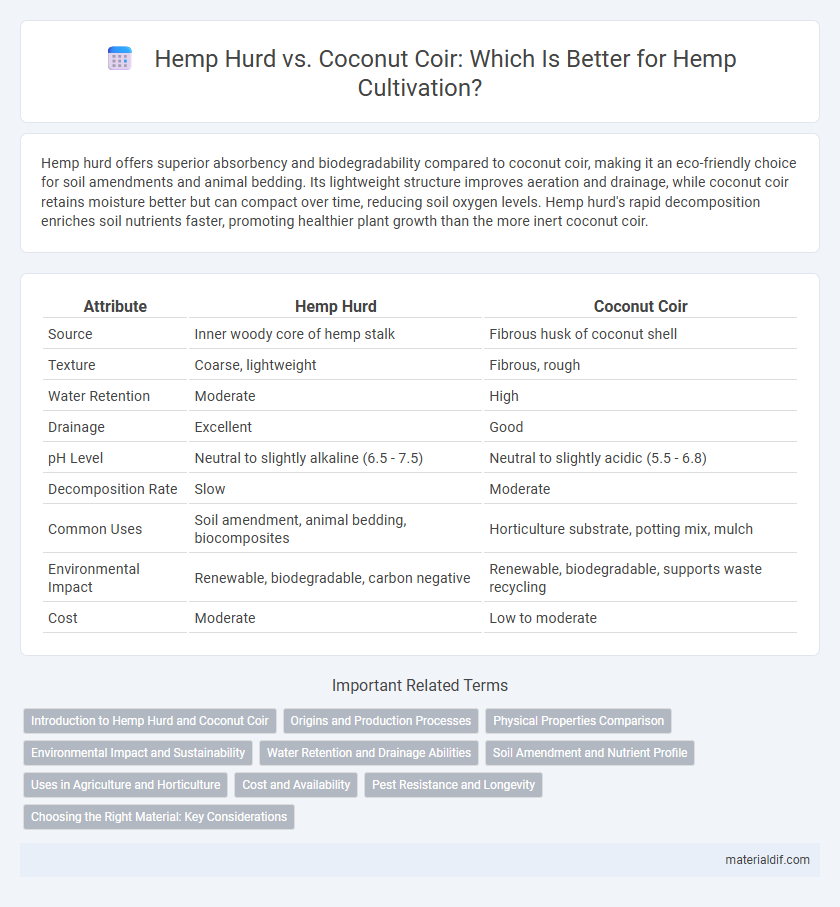Hemp hurd offers superior absorbency and biodegradability compared to coconut coir, making it an eco-friendly choice for soil amendments and animal bedding. Its lightweight structure improves aeration and drainage, while coconut coir retains moisture better but can compact over time, reducing soil oxygen levels. Hemp hurd's rapid decomposition enriches soil nutrients faster, promoting healthier plant growth than the more inert coconut coir.
Table of Comparison
| Attribute | Hemp Hurd | Coconut Coir |
|---|---|---|
| Source | Inner woody core of hemp stalk | Fibrous husk of coconut shell |
| Texture | Coarse, lightweight | Fibrous, rough |
| Water Retention | Moderate | High |
| Drainage | Excellent | Good |
| pH Level | Neutral to slightly alkaline (6.5 - 7.5) | Neutral to slightly acidic (5.5 - 6.8) |
| Decomposition Rate | Slow | Moderate |
| Common Uses | Soil amendment, animal bedding, biocomposites | Horticulture substrate, potting mix, mulch |
| Environmental Impact | Renewable, biodegradable, carbon negative | Renewable, biodegradable, supports waste recycling |
| Cost | Moderate | Low to moderate |
Introduction to Hemp Hurd and Coconut Coir
Hemp hurd is the woody inner core of the hemp stalk, renowned for its lightweight, absorbent, and biodegradable properties, making it ideal for construction materials, animal bedding, and horticulture. Coconut coir, derived from the fibrous husk of coconut shells, offers excellent water retention, aeration, and durability, commonly used in soil conditioners, erosion control, and hydroponic growing mediums. Both hemp hurd and coconut coir serve as sustainable alternatives to traditional materials, leveraging their natural composition for eco-friendly applications.
Origins and Production Processes
Hemp hurd is derived from the inner woody core of the hemp stalk, primarily cultivated in regions like Europe, Canada, and China through mechanical decortication that separates the hurd from the outer fibers. Coconut coir originates from the fibrous husk surrounding the coconut shell, primarily produced in tropical countries such as India, Sri Lanka, and the Philippines through retting and mechanical extraction. The production process of hemp hurd involves drying and milling to create a lightweight, absorbent material, whereas coconut coir undergoes retting and fiber extraction, resulting in a coarse, water-retentive substrate.
Physical Properties Comparison
Hemp hurd exhibits a lightweight, porous structure with exceptional absorbency and thermal insulation, making it ideal for construction and horticulture. Coconut coir boasts high durability, fibrous texture, and superior moisture retention, benefitting soil aeration and erosion control. Both materials feature unique physical properties suited for sustainable applications, with hemp hurd excelling in insulation and coir in water management.
Environmental Impact and Sustainability
Hemp hurd generates significantly less environmental pollution compared to coconut coir due to its rapid growth cycle and minimal water requirement, making it a highly sustainable resource. Unlike coconut coir, which often involves extensive processing and long-distance transportation, hemp hurd's local cultivation reduces carbon emissions and soil degradation. The biodegradability and nutrient-rich properties of hemp hurd also enhance soil health, supporting sustainable agricultural practices more effectively than coconut coir.
Water Retention and Drainage Abilities
Hemp hurd offers superior water retention compared to coconut coir due to its porous structure, allowing it to hold moisture effectively while preventing waterlogging. Coconut coir excels in drainage abilities, facilitating quick water passage and reducing root rot risks in potted plants. Combining hemp hurd and coconut coir can optimize soil aeration, moisture balance, and overall plant health for horticultural applications.
Soil Amendment and Nutrient Profile
Hemp hurd offers superior water retention and aeration compared to coconut coir, making it an excellent soil amendment for improving soil structure and promoting root growth. Its porous nature allows for better nutrient absorption and microbial activity, enhancing soil fertility over time. Coconut coir provides moderate nutrient content but tends to have a higher salt concentration, which can affect sensitive plants negatively.
Uses in Agriculture and Horticulture
Hemp hurd and coconut coir serve distinct roles in agriculture and horticulture, with hemp hurd offering superior moisture retention and aeration for soil amendment and seed starting. Coconut coir excels as a sustainable growing medium due to its high water retention, fungal resistance, and ability to improve soil structure in potting mixes. Both materials contribute to enhanced plant growth, but hemp hurd is preferred for soil conditioning while coconut coir is favored for hydroponics and container gardening.
Cost and Availability
Hemp hurd offers a cost-effective alternative to coconut coir, with prices generally lower due to widespread industrial hemp farming and efficient processing methods. Availability of hemp hurd is increasing rapidly in North America and Europe, driven by expanding hemp cultivation and less reliance on tropical imports compared to coconut coir, which remains regionally constrained to tropical areas like Southeast Asia. Both materials serve as sustainable growing mediums, but hemp hurd's growing market presence improves accessibility and reduces dependency on fluctuating coconut coir supply chains.
Pest Resistance and Longevity
Hemp hurd exhibits superior pest resistance due to its natural antifungal and antibacterial properties, making it less susceptible to insect damage compared to coconut coir. Coconut coir, while durable and moisture-retentive, is more prone to mold and pest infestations over time. In terms of longevity, hemp hurd maintains structural integrity longer in outdoor and humid environments, enhancing its applications in sustainable construction and agriculture.
Choosing the Right Material: Key Considerations
Hemp hurd offers superior absorbency and faster biodegradability compared to coconut coir, making it ideal for eco-friendly gardening and sustainable construction. Coconut coir provides excellent water retention and durability, beneficial for long-term soil aeration and erosion control. Selecting the right material depends on factors such as moisture retention needs, environmental impact, and intended application.
Hemp hurd vs Coconut coir Infographic

 materialdif.com
materialdif.com